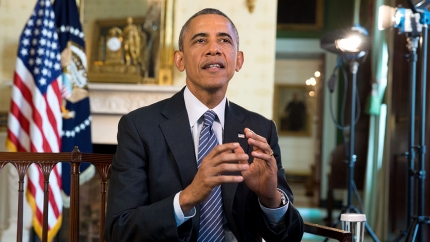Remarks by President Obama and President Michelle Bachelet of Chile Before Bilateral Meeting
Oval Office
11:05 A.M. EDT
PRESIDENT OBAMA: Well, I want to welcome back to the Oval Office President Bachelet. She is my second favorite Michelle. (Laughter.) And I’m very much pleased to see her again. We had the opportunity to work together when I first came into office. Since that time, President Bachelet has been extraordinarily busy doing excellent work at the United Nations, particularly around women -- an issue that the United States has been very supportive of. And we’re very proud of the work that she did there.
She’s now back in office, and it gives us an opportunity to just strengthen further the outstanding relationship between the United States and Chile.
Let me say, first of all, congratulations to the Chilean National Football Team for an outstanding showing at the World Cup. I know it was a tough loss, but it also showed the incredible skill and talent of the Chilean team. This is as well, I think, as it’s ever done against a very tough Brazilian team on their home turf. And so congratulations to them. We play -- coming up, we’ve got a tough match as well. So I want to wish the U.S. team a lot of luck in the game to come.
The basis for Chile’s and the United States’ strong bilateral relationship includes the fact that we have a free trade agreement that has greatly expanded commerce in both countries and has created jobs in both countries.
We have excellent cooperation when it comes to a wide range of issues -- energy, education, people-to-people relations. Chile has been a model of democracy in Latin America. It’s been able to consistently transition from center-left governments to center-right governments, but always respectful of democratic traditions. Obviously, those traditions were hard-won, and President Bachelet knows as well as anybody how difficult it was to bring about democracy. And now, the fact that Chile across the political spectrum respects and fights for the democratic process makes it a great model for the entire hemisphere.
Today, we’re going to have an opportunity to discuss how we can deepen those relationships even further. I know that education, for example, is an issue that is at the top of President Bachelet’s agenda. It’s something that’s at the top of my agenda here in the United States. For us to be able to strengthen student exchanges and compare mechanisms and ideas for how we can build skills of young people in both countries is something that we’ll spend some time on.
We’re both very interested in energy and how we can transition to a clean energy economy. And we’ll be announcing some collaborations, including the facilitation of a construction of a major solar plant inside of Chile that can help meet their energy needs.
We’ll talk about regional issues. Obviously, we’ve seen great progress in democratization throughout the region, in part because of Chile’s leadership, but there are obviously still some hotspots that we have to try to address, as well as issues of security in areas like Central America and the Caribbean. And I’ll be very interested in hearing President Bachelet’s views.
And we’ll discuss international issues. Chile, with its seat on the United Nations Security Council, can serve as a leader on a wide range of issues, from peacekeeping to conflict resolution, to important issues like climate change. And we have great confidence that in that role Chile will continue to be a positive force for good around the world.
So I just want to say thank you for not only the friendship with President Bachelet, but more broadly, our friendship with the Chilean people. And President Bachelet’s predecessor, he and I had an excellent relationship; she and I have had an excellent relationship. I think that indicates that it really goes beyond any particular party. I’m confident that my replacement after I’m gone will have an excellent relationship, because it’s based on common values and a strong respect in both countries for the value of the U.S.-Chilean relationship.
So, welcome, and I look forward to an excellent conversation.
PRESIDENT BACHELET: Thank you, President Obama. I want to, first of all, thank you for the invitation to visit you and your country. And, of course, we are looking forward to enhance our cooperation in many different areas.
As you just mentioned, Chile and the U.S. have had a very strong and mature relation for so many years, and we want to make it deeper and to enhance them in different areas. Of course, this will be a great opportunity, as you said, to discuss some of the regional and international issues, given the fact that we’re also sitting at the Security Council. But also, we will be able to in the bilateral dimension be able to increase our cooperation in areas that are very sensible, and for the U.S. and for Chile, such as you mentioned, education, energy, science and technology, people-to-people relation.
We already have, as you know, a very good -- I mean, not only the bilateral way, we also have a very good Chile-California and Chile-Massachusetts programs. We have been working very strongly and we will continue on that path.
And we are really interested -- this year, I think we are commemorating 10 years of the free trade agreement from the U.S. and Chile. And the U.S. is our, I would say, our most important foreign investor. We want to continue that path, and of course, we will have also the possibility of having activities with the Chamber of Commerce and others because we really want to make our relations in all dimensions -- political, economical, social, et cetera -- stronger and stronger every day.
So I’m very happy to be here with you again, and I’m sure this will be a great meeting.
PRESIDENT OBAMA: Thank you.
END
11:12 A.M. EDT

